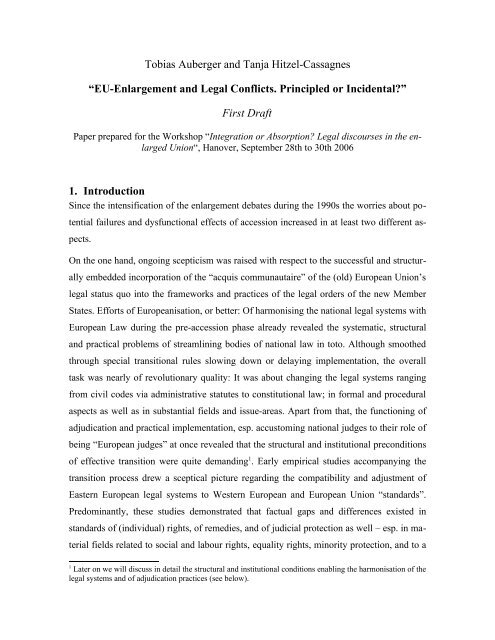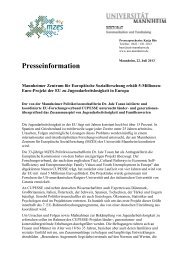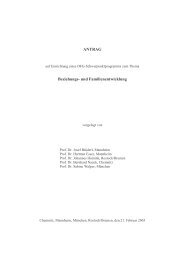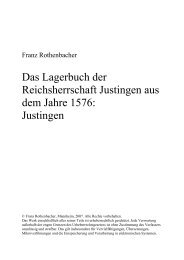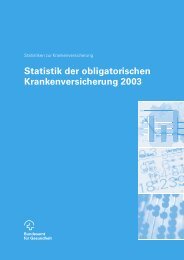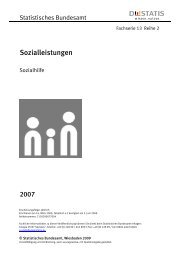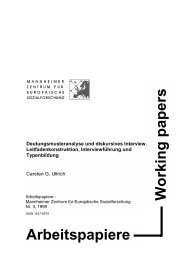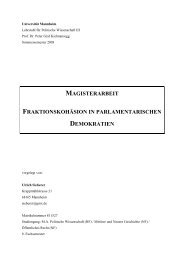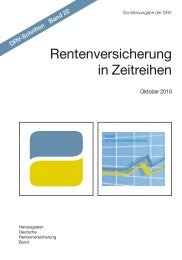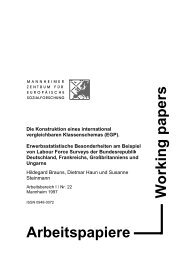Tobias Auberger and Tanja Hitzel-Cassagnes - Mzes
Tobias Auberger and Tanja Hitzel-Cassagnes - Mzes
Tobias Auberger and Tanja Hitzel-Cassagnes - Mzes
You also want an ePaper? Increase the reach of your titles
YUMPU automatically turns print PDFs into web optimized ePapers that Google loves.
<strong>Tobias</strong> <strong>Auberger</strong> <strong>and</strong> <strong>Tanja</strong> <strong>Hitzel</strong>-<strong>Cassagnes</strong><br />
“EU-Enlargement <strong>and</strong> Legal Conflicts. Principled or Incidental?”<br />
First Draft<br />
Paper prepared for the Workshop “Integration or Absorption? Legal discourses in the enlarged<br />
Union“, Hanover, September 28th to 30th 2006<br />
1. Introduction<br />
Since the intensification of the enlargement debates during the 1990s the worries about potential<br />
failures <strong>and</strong> dysfunctional effects of accession increased in at least two different aspects.<br />
On the one h<strong>and</strong>, ongoing scepticism was raised with respect to the successful <strong>and</strong> structurally<br />
embedded incorporation of the “acquis communautaire” of the (old) European Union’s<br />
legal status quo into the frameworks <strong>and</strong> practices of the legal orders of the new Member<br />
States. Efforts of Europeanisation, or better: Of harmonising the national legal systems with<br />
European Law during the pre-accession phase already revealed the systematic, structural<br />
<strong>and</strong> practical problems of streamlining bodies of national law in toto. Although smoothed<br />
through special transitional rules slowing down or delaying implementation, the overall<br />
task was nearly of revolutionary quality: It was about changing the legal systems ranging<br />
from civil codes via administrative statutes to constitutional law; in formal <strong>and</strong> procedural<br />
aspects as well as in substantial fields <strong>and</strong> issue-areas. Apart from that, the functioning of<br />
adjudication <strong>and</strong> practical implementation, esp. accustoming national judges to their role of<br />
being “European judges” at once revealed that the structural <strong>and</strong> institutional preconditions<br />
of effective transition were quite dem<strong>and</strong>ing 1 . Early empirical studies accompanying the<br />
transition process drew a sceptical picture regarding the compatibility <strong>and</strong> adjustment of<br />
Eastern European legal systems to Western European <strong>and</strong> European Union “st<strong>and</strong>ards”.<br />
Predominantly, these studies demonstrated that factual gaps <strong>and</strong> differences existed in<br />
st<strong>and</strong>ards of (individual) rights, of remedies, <strong>and</strong> of judicial protection as well – esp. in material<br />
fields related to social <strong>and</strong> labour rights, equality rights, minority protection, <strong>and</strong> to a<br />
1<br />
Later on we will discuss in detail the structural <strong>and</strong> institutional conditions enabling the harmonisation of the<br />
legal systems <strong>and</strong> of adjudication practices (see below).
2<br />
certain extent citizenship rights (see Blanco Sio-Lopez 2006, Breda 2006, Gosewinkel<br />
2005, Petersen 2005, Reich 2005, Sloat 2004, Pridham 2006).<br />
On the other h<strong>and</strong>, concerns about dysfunctional or disruptive effects to the very progress<br />
of (old)European Constitutionalisation have been raised – reaching from fears of giving up<br />
a fragile but accomplished “constitutional compromise” <strong>and</strong> of impeding further constitutionalisation<br />
to fears of disrupting the institutional balance within the EU as well as the<br />
status quo of interaction between national <strong>and</strong> supranational (esp. legal) actors <strong>and</strong> institutions.<br />
A second class of concerns related in a broadest sense to what might be called<br />
“Europeanness”, or better: To the ideational preconditions of a functioning European Polity<br />
– be it in the sense of a necessary common pre-political cultural identity or in the sense of a<br />
mere co-operative (<strong>and</strong> political) orientation <strong>and</strong> commitment to the “rules of the game”<br />
(depending on <strong>and</strong> varying according to the different notions of the European Union’s “finality”).<br />
A third class of concerns was articulated from a rather pluralist-sceptic point of<br />
view <strong>and</strong> emphasised the potential dysfunctional effects of increased plurality <strong>and</strong> diversity<br />
within an enlarged Union. These concerns related to quite different fields, to political processes<br />
in general as well as to concrete institutional practices. Anxieties about further fragmentation<br />
through enhanced co-operation, opt-outs e.g., <strong>and</strong> about deepening conflicts over<br />
cultural <strong>and</strong> political values, along with anxieties about disruptive effects of divergent collective<br />
memories were articulated.<br />
These – although divergent – kinds of considerations might at first sight suggest ways <strong>and</strong><br />
strategies to answer the question whether the European Union’s Enlargement poses<br />
obstacles that might be classified as either principled or merely incidental, i.e., whether<br />
these problems are of a genuine structural origin <strong>and</strong> of different kind or whether they hint<br />
to a re-articulation of conflicts that have ever been inherent to the process of European integration<br />
2 . However, in the following we will argue that this expectation proves to be too<br />
short-sighted. At a closer look, all the above mentioned scepticisms basically share one<br />
2<br />
We will come back to this assumption. For the moment it suffices to remind at a couple of “hard” cases in<br />
the course of European Integration. One conflict line that has since the late 1970s until today played a role<br />
was about how to classify the European Community as a “Polity” – be it a “funktionaler Zweckverb<strong>and</strong>”, a<br />
social or a democratic <strong>and</strong> political Community or Union. Deriving from these different basic notions, the<br />
character of the European Union’s constitutional order <strong>and</strong> its material legal content has always been debated:<br />
Incremental or quasi-constitution, factual vs. normative (democratically justified) constitution, failed or constitution<br />
proper etc.
3<br />
common feature: They conceive the Enlargement-process as a rather one-sided process of<br />
transformation characterised as an adjustment on behalf of the new Member States. This<br />
view relies on the notion that transformation is a pre-defined path, that it is unequivocally<br />
pre-figured <strong>and</strong> hence procedurally <strong>and</strong> substantially closed. The problem is that this view<br />
neglects, that, firstly, transformative processes will also affect the status of the (old) Member<br />
States. Therefore, enlargement implies a mutual adjustment rather than merely a onesided<br />
one. Secondly, the status quo <strong>and</strong> modus oper<strong>and</strong>i of the European Union is affected<br />
too – so it is much more plausible to regard Enlargement as a transformative process within<br />
the European Union itself. Both objections lead to the conclusion, that openness <strong>and</strong> reversibility<br />
are so far neglected – though, to our mind, systematically they are procedural features<br />
of the Enlargement process. But let us have a quick look at the problems associated<br />
with the incorporation of the “aquis communautaire” <strong>and</strong> the constitutionalisation process<br />
of the European Union.<br />
a.) Regarding the above mentioned worries about successful implementation of the<br />
“acquis communautaire”, the picture is fall less clear than stated by the critics. The<br />
development of the European Union is characterised by continuous conflicts about<br />
the substantial content <strong>and</strong> scope of law that can be qualified as being part of the<br />
“acquis”. Thus, the “acquis” itself has always been a contested concept, <strong>and</strong> its acknowledgement<br />
by the national legal orders in particular hesitant <strong>and</strong> disputed.<br />
Apart from that, there have always been conflicts about the material content <strong>and</strong><br />
meaning of the “acquis” as a body of law. The reasons for this are of various kinds:<br />
Firstly, the “acquis communautaire” is fragmented into quasi-constitutional principles<br />
of law (supremacy <strong>and</strong> direct effect on the one h<strong>and</strong>, basic <strong>and</strong> individual<br />
rights, proportionality on the other), procedural <strong>and</strong> administrative statutes, <strong>and</strong> material<br />
codes in different areas (from purely economic/competition/market-law to social<br />
<strong>and</strong> political rights like citizenship). Secondly, the legal instruments of the “acquis”<br />
are differentiated according to range <strong>and</strong> binding effect depending on the kind<br />
of legal source (treaty-law, regulation, directives, <strong>and</strong> precedents). Thirdly, <strong>and</strong> that<br />
might be the most crucial aspect, the structure of the “aquis” highly depends on a<br />
broader definition of the European Union as a functional, social or political community<br />
– these background orientations are not least determining the concept of
4<br />
rights associated with them, e.g. negative rights of (economic) freedom on the one<br />
h<strong>and</strong> vs. positive (social, political, <strong>and</strong> procedural) rights on the other. These systematic<br />
difficulties can very well be illustrated by concrete conflicts about the legal<br />
status quo of the European Union: E.g., the enforcement of supremacy <strong>and</strong> Direct<br />
effect as cornerstones at the level of “constitutional principles”; the jurisdiction relating<br />
to non-discrimination <strong>and</strong> equality (the extension from a negative, market-related<br />
principle to a universal norm of equality even allowing affirmative action) is<br />
another striking example, as well as the incremental incorporation of social rights<br />
<strong>and</strong> protective measures; since the inclusion of “European Citizenship” in the treaty<br />
of Amsterdam the jurisdiction about the political <strong>and</strong> procedural notions of citizenship-rights<br />
has been contested (regarding different access-rights for instance).<br />
Consequently, one practical effect of these disputes is that the actual implementation<br />
of what might be called the “acquis” varies among the (old) Member States – existing<br />
opt-out <strong>and</strong> enhanced cooperation agreements are but one example; apart from<br />
that, however, it is illusionary to expect harmonisation to be unitary <strong>and</strong> fully accomplished.<br />
Regarding the enlarged integration, it is quite obvious that the idea of<br />
transposing the “aquis” is crucial for upholding the very idea of a Community (but<br />
this is always the case) – yet, the above mentioned examples show that any streamlining<br />
of the European system by means of fully <strong>and</strong> “in toto” incorporating the<br />
“aquis” is a process that is (still) open-ended <strong>and</strong> reversible. Problems of incorporation<br />
might well be rooted in structural <strong>and</strong> practical “defects”, but they may as well<br />
be provoked by serious, principled <strong>and</strong> justified contestation. To our mind, in order<br />
to clarify the source of the problems, a procedural openness is necessary to enable<br />
mutual <strong>and</strong> reciprocal dialogue to adjust the “aquis” acceptable to all participants<br />
(see below).<br />
b.) This line of argumentation indicates to a certain extent that – in quite a similar way<br />
– the worries about the constitutional status quo of the European Union take a<br />
wrong way. It is misleading to consider the status of the Constitutionalisation of the<br />
European Union as accomplished. The picture the critiques draw of the situation of<br />
accession is too prefigured <strong>and</strong> static insofar as it suggests that accession is for the<br />
new Member States just a matter of receiving a constitutional order prêt-a-porter.
5<br />
Even in reality, as certain studies showed, things went better: The prospect of enlargement<br />
created in the first place the opportunity <strong>and</strong> practical pressure for further<br />
constitutional developments after Copenhagen. The accession process offered the<br />
chance (which was willingly used) to set up debates <strong>and</strong> dialogues about foundational<br />
constitutional principles (esp. democracy) of the Union (see Dangerfield<br />
2006, Ellison 2005, Walker 2003, Weiss 2005). The according institutional reforms<br />
were highly influenced by the vision of an enlarged Union: “The eastern enlargement<br />
influenced the constitutional developments in the EU even beyond the issue of<br />
merely institutional reforms. The political conditions for membership set at the<br />
Copenhagen summit <strong>and</strong> the importance of these values in the accession negotiations<br />
helped to stimulate the sensitivity for democracy <strong>and</strong> basic values within the<br />
EU <strong>and</strong> its constitutional order itself, which influenced the agenda at Amsterdam<br />
IGC” (Weiss 2005: 3, stress by <strong>Auberger</strong>/<strong>Hitzel</strong>-<strong>Cassagnes</strong>). In systematic terms,<br />
this quote hints at two important points. On the one h<strong>and</strong>, we should give up notions<br />
of the Enlargement as an external reference point: Enlargement (or better: the process<br />
of accession) is inevitably part of the European Constitutionalisation <strong>and</strong> vice<br />
versa. At the same time but on the other h<strong>and</strong>, if we take this internal perspective<br />
(not differentiating between in- <strong>and</strong> outsiders in a way), we can conceptually interpret<br />
the present situation as a foundational one insofar as the inclusion of “new<br />
voices” creates a new “constitutional moment” of its own. Thus, the focal point<br />
should not be the potential loss of the “old” order but the openness of constitutional<br />
processes <strong>and</strong> revisions.<br />
We want to take these introductory remarks as a starting point for introducing a normative<br />
interpretation of the Enlargement process which we will take as a conceptual background to<br />
evaluate the legal, i.e. constitutional, conflicts <strong>and</strong> developments relating to the above mentioned<br />
question of the structural impacts of enlargement (2). For the sake of clarifying the<br />
systematic <strong>and</strong> normative challenges associated with an enlarged Union we will discuss<br />
four selected issues exemplifying considerations of fragmentation, incommensurabilities<br />
<strong>and</strong> asymmetries (3).
6<br />
2. Enlargement as a normative challenge for the European Union<br />
In normative terms, the idea of constitutionalising the European Union is – compared with<br />
the st<strong>and</strong>ards traditionally associated with constitution-making proper – ambiguous in several<br />
aspects: First of all there is a lack of a factual foundational moment including<br />
something like a constitutional assembly <strong>and</strong> in particular a visible “pouvoir constituant”,<br />
able to articulate <strong>and</strong> execute a “general”, constitutionalising will. On the other h<strong>and</strong>, basic<br />
features of the development of the European legal system (i.e. supremacy, direct effect, the<br />
incorporation of human <strong>and</strong> fundamental individual rights, the establishment of a system of<br />
judicial review <strong>and</strong> appeal) have frequently been characterised as being part of a process of<br />
constitutionalisation – however, in normative terms, these qualifications have always been<br />
subject to disagreement. If one is willing to accept the “factual” <strong>and</strong> incremental development<br />
of the European legal system as a process of Constitutionalisation, serious questions<br />
about the justification <strong>and</strong> legitimacy of such a “Constitution” arise – questions, the<br />
European Union itself has tried to tackle by establishing such fora like the charter of fundamental<br />
rights <strong>and</strong> the Convention. Although we cannot – at this point – argue for it in detail,<br />
we do not want to deny the genuine “constitutional” status of the European legal system;<br />
however, in normative terms this (factual, incremental, mainly informal <strong>and</strong> elite-driven)<br />
constitutionalisation can be legitimised only if it takes the form of processes of justification,<br />
because only processes of justification can guarantee reciprocal underst<strong>and</strong>ing as<br />
well as mutual recognition <strong>and</strong> acceptance 3 .<br />
Legitimate processes of justification therefore have to meet two sets of normative criteria.<br />
On a general level, such processes have to be essentially discursive or dialogical, in other<br />
words: A reciprocal game of reason-giving <strong>and</strong> reason-taking has to be established, furthermore,<br />
they have to be open for contestation. Both aspects imply the notion of equal concern<br />
<strong>and</strong> respect which has to be realised by the equality of voices on the one h<strong>and</strong> <strong>and</strong> the potential<br />
inclusiveness of all stakes on the other h<strong>and</strong>. On the procedural level in concrete,<br />
these processes of justification have to be characterised by the principles of transparency,<br />
3<br />
In the same vein we cannot in extenso outline <strong>and</strong> justify this normative starting point basically relying on<br />
conceptual notions of discourse theory <strong>and</strong> deliberative democratic theory. For further <strong>and</strong> principled elaboration<br />
see Habermas (1992, 1994, 2001 <strong>and</strong> 2003), Forst (1999 <strong>and</strong> 2005), Schmalz-Bruns (1995), Michelman<br />
(XX). For different approaches relating to the supra-, trans- <strong>and</strong> international level see Bohman (2004), Closa<br />
(2005), Gerstenberg (2002), Eriksen (2005), <strong>Auberger</strong>/<strong>Hitzel</strong>-<strong>Cassagnes</strong> (2005), Schmalz-Bruns (2005), Menendez<br />
(2005), Joerges (2002).
7<br />
openness <strong>and</strong> reversibility. Thus, constitutionalisation can only be regarded as being legitimate<br />
if it is able to meet these normative st<strong>and</strong>ards. Processes of justification inevitably<br />
rely on a specific structure embodying these principles, <strong>and</strong> ensuring the normative quality,<br />
or better: the “rational acceptability” of the outcomes.<br />
The accession of the new Member States, resp. the enlargement of the European Union, has<br />
often been viewed as a mere extension of the constitutionalising process we have so far observed,<br />
that means, not touching the status quo of the polity itself. Part of this view forms<br />
the idea that the new Member states fit in smoothly without “really” making a difference.<br />
The problem is that this view is not able to acknowledge the new Member States’ status as<br />
equally being able to induce change <strong>and</strong> to influence the very process of constitutionalisation<br />
– bluntly speaking, this view represents much more a perspective of colonialisation.<br />
Another idea is related to the expectation, that the new Member States incorporate the body<br />
of existing European law (i.e. the “acquis communautaire”) of the “European Constitution”<br />
without dissent <strong>and</strong> derogation. Furthermore, they are not expected to shift the margins of<br />
interpretation <strong>and</strong> dispose of contested meanings <strong>and</strong> concepts. We have already remarked<br />
that this perception is in normative terms dissatisfying because it neglects the requirement<br />
of procedural openness of processes of European constitutionalisation in order for them to<br />
be acceptable <strong>and</strong> legitimate. Apart from that, we suggest to regard accession as a “foundational”<br />
situation that should be considered as being in normative terms an opportunity or<br />
chance. To our mind, it is useful to interpret enlargement as a kind of structurally determined<br />
point of constitutional reflexivity. In this perspective, accession should be seen as a<br />
“Sollbruchstelle” of European Constitutionalisation. Insofar as the new Member states are<br />
of equal stance for European Integration, their participation includes the possibility of contestation<br />
<strong>and</strong> potential reversibility – which are, in our point of view, exactly the normativeprocedural<br />
requirements of constitutionalisation. So, within this framework, integration is<br />
to be conceptualised as processes of mutual recognition <strong>and</strong> underst<strong>and</strong>ing. In particular, it<br />
highlights the role of reciprocal dialogues which, apart from ensuring the acceptability of<br />
the outcomes, foster mutual learning-processes. At this point of the argumentation, we<br />
would like to take the idea that mutual learning processes form the baseline of (in normative<br />
terms successful) accession-processes as a point of departure for a closer look at different<br />
(institutional, structural or practical) problems associated with an enlarged Union. This
8<br />
starting point should provide us with a kind of heuristic device in order to identify the<br />
status of the problems <strong>and</strong> to examine their normative relevance in particular. The introductory<br />
remarks about the difficulties associated with the incorporation of the “acquis” <strong>and</strong><br />
the integration of the new Member States in the European constitutional order demonstrates<br />
a great variety <strong>and</strong> disparity of the kind of defects identified. They ranged from mere practical<br />
considerations to fundamental doubts about the structural preconditions for successful<br />
integration. Although we cannot systematically discuss all of these aspects we would like to<br />
elaborate on a few, distinct <strong>and</strong> exemplary, issues: (1.) differences <strong>and</strong> difficulties of implementation<br />
in the field of mainly individual rights, (2.) cultural fragmentation <strong>and</strong> incommensurabilities,<br />
(3.) asymmetries of voice, <strong>and</strong> finally, (4.) Differences of concepts of law.<br />
By discussing these issues we will sort the problems along the lines sketched out above,<br />
i.e., we will evaluate their status in terms of structural impact on the one h<strong>and</strong>, <strong>and</strong> in terms<br />
of effectuating the normative quality of Constitutionalisation on the other h<strong>and</strong>. Accordingly,<br />
the idea of mutual learning-processes serves, as mentioned above, as a heuristic<br />
framework esp. to assess integration in the enlarged Union. In this way we hope to specify<br />
some kind of enabling conditions of transformation.<br />
3. Enlargement <strong>and</strong> reflexive integration<br />
3.1. Difficulties of implementation<br />
The first sort of problems relates to a diagnosis of fundamental differences within the enlarged<br />
Union regarding all those individual <strong>and</strong> group rights considered to be crucial to any<br />
broader concept of democratic participation, i.e., minority rights, non-discrimination rights<br />
<strong>and</strong> to a certain extent social rights (see Darke 2005, Hartkamp 2004, O’Hagan 2004, Reich<br />
2005, Schmidt 2006, Sloat 2004, Wiener/Schwellnus 2004). The implementation of the<br />
“acquis communautaire”, i.e. the transposition of its distinct <strong>and</strong> substantial elements into<br />
national law has been at the core of the adjustments dem<strong>and</strong>ed of the c<strong>and</strong>idate countries.<br />
Regarding the set of concrete requirements spelled out by the Copenhagen criteria, most of<br />
them can be challenged in normative terms depending on the peculiarities of different approaches<br />
to individual <strong>and</strong> human rights as well as on the particular conceptions of democracy<br />
<strong>and</strong> the rule of law principle. Yet, the most contested part was the required implementation<br />
of minority rights. On the one h<strong>and</strong>, the protection of minorities played an im-
9<br />
portant role in the European foreign policy after 1989 <strong>and</strong> especially in its accession<br />
strategies while, on the other h<strong>and</strong>, the c<strong>and</strong>idate states differed widely with respect to an<br />
active minority policy, to the recognition of internal minorities, <strong>and</strong> to the granting of<br />
minority rights. The practices of implementing minority <strong>and</strong> non-discrimination rights by<br />
the c<strong>and</strong>idate states during the accession negotiations showed that the actual influence of<br />
EU conditionality depended on internal conditions especially in the Eastern European countries<br />
<strong>and</strong> that national legislation differed substantially (see Wiener/Schwellnus 2004). Although<br />
the factual existence of internal <strong>and</strong> external minorities <strong>and</strong> the constellations of internal<br />
actors played a decisive role, differences regarding the incorporation of minority<br />
rights might also have stemmed from the lack of a single <strong>and</strong> coherent minority policy of<br />
the 'old' Union towards the c<strong>and</strong>idate countries. During the accession negotiations the<br />
European Union accepted <strong>and</strong> promoted quite divergent conceptions of minority protection<br />
<strong>and</strong> accordingly, different legal remedies <strong>and</strong> procedures. As the studies of Wiener <strong>and</strong><br />
Schwellnus reveal, at the time, the Union's minority policy referred to conceptions borrowing<br />
from doctrines of the United Nations on the one h<strong>and</strong>, the OSCE <strong>and</strong> Council of Europe<br />
on the other h<strong>and</strong> – which are conflicting insofar as the UN's definition of minorities is<br />
rather broad <strong>and</strong> comprehensive whereas the OSCE's conception of minority rights restricts<br />
its scope to citizens, i.e., excluding emerging groups of unsettled <strong>and</strong> precarious (legal)<br />
status (see Wiener/Schwellnus 2004: 33). This very sketchy reference might suffice to point<br />
out that within the European Union, the status of minority protection <strong>and</strong> the concepts of<br />
minority rights have been heterogeneous as well as internally contested <strong>and</strong> ambivalent<br />
(esp. if one takes Wiener’s remarks seriously, pointing at a kind of “hypocrisy” emphasising<br />
minority rights with regard to the new member states but neglecting them in an “internal”<br />
perspective).<br />
A similar picture can be drawn by examining the incorporation of the acquis in various<br />
fields like equality, non-discrimination <strong>and</strong> social rights. The European regulation of social<br />
<strong>and</strong> working st<strong>and</strong>ards, of non-discrimination rights <strong>and</strong> of measures to promote gender<br />
equality has been formally implemented in the new member states at quite an early stage.<br />
Again, rather similar to the old member states the new member states vary with respect to<br />
the conceptualization of social rights, to concrete measures <strong>and</strong> institutions as well as to the<br />
overall scope of accomplishment (see Sloat 2004). So, in a way, the mere observation of
10<br />
differences can not, at first h<strong>and</strong>, be considered to be a structural feature the new member<br />
states share exclusively, because even within the 'old' union social st<strong>and</strong>ards <strong>and</strong> rights relating<br />
for instance to gender equality are contested <strong>and</strong> far away from being unitary (see<br />
Wiener/Schwellnus 2004, Thym 2005, Tully 2006).<br />
Both fields of rights show that the Enlargement of the European Union is more than just<br />
easily extending the existing Union with a settled <strong>and</strong> coherent corpus of (esp. individual)<br />
rights. Quite on the contrary, the problems of incorporating a unified set of individual <strong>and</strong><br />
human rights revealed the contested nature of those rights in terms of protection spheres,<br />
scope of application, procedural guarantees <strong>and</strong> remedies, <strong>and</strong> to a certain extent of the<br />
normative core of the “acquis” within the 'old' Union in these respects. Considering these<br />
problems of “ambiguity”, enlargement should rather raise expectations to foster reciprocal<br />
underst<strong>and</strong>ing in the framework of a discursive project; insofar it could serve as a departure<br />
point for a reflexive consideration of the normative, substantial <strong>and</strong> procedural basis of individual<br />
<strong>and</strong> human rights within the European Union <strong>and</strong> its member states.<br />
3.2. Cultural incommensurabilities<br />
The second group of concerns brought up about a functionally successful <strong>and</strong> normatively<br />
valuable constitutionalisation of an enlarged Union refers to differences of the (political-)<br />
cultural background 'dividing' parts of the new members from the “old” European Union.<br />
The most prominent <strong>and</strong> fundamental aspect among these concerns is the rise of ethnically<br />
based nationalisms in Eastern European states after the fall of the Soviet system. Although<br />
far from being new ideologies without historical roots <strong>and</strong> precedents patriotic <strong>and</strong> nationalist<br />
concepts reawakened after 1989 - <strong>and</strong> were even reinvented (Priban 2005: 151) - as a<br />
perceived cultural fundament of the constitutional transformation from socialist states into<br />
democratic (nation-)states. Even if these identity based concepts may vary with respect to<br />
extent <strong>and</strong> (discriminatory) quality, it is apparent that in each of the new member states the<br />
rise of ethnically constructed “nationalisms” is a common feature – this phenomenon has<br />
frequently tried to be explained in theoretical terms as a transformational problem, i.e., that<br />
the (more or less) fragile new states had to rely on strong common identities in order to succeed<br />
in transforming into a “modern” nation state (see Kitous 2006, Blanco Sio-Lopez<br />
2006, Marin 2006).
11<br />
Apart from the fact that these constructions are not <strong>and</strong> have never been uncontested <strong>and</strong><br />
apart from the fact that in most of the new member states minorities that are excluded from<br />
the ethnically determined notion of “nation”exist(ed), there are several problems on a more<br />
general level. The construction of shared identity, substantialised on the basis of ethnos is<br />
in any way based on an ethnical <strong>and</strong> cultural rigidity not open to contestation <strong>and</strong> procedural<br />
reversibility, so it inevitably falls short with respect to the fundamental normative idea of<br />
mutual recognition. And it is obviously even more awkward if ethno-nationalist attitutes<br />
have to come to terms with European Integration <strong>and</strong> European constitutionalisation in particular:<br />
In this perspective, the absence of even the slight chance of successfully constructing<br />
or inventing a shared (political <strong>and</strong> civic) identity on European level along the given national<br />
paths seems to render further integration unfeasible. The suspicion is that the Eastern<br />
European countries will be defending their recently gained national sovereignty at the cost<br />
of further integration <strong>and</strong> at the cost of their European partners. Insofar as there are these<br />
kind of stumbling stones for the establishment of a European civic identity, based on a secular,<br />
rights-based <strong>and</strong> political ethos, further integration is itself seriously encumbered. But<br />
although the newly 'emerged' nationalist movements may seem to refer to a greater extent<br />
to notions of ethnicity than their Western <strong>and</strong> Southern European counterparts, it is definitely<br />
too short-sighted to believe these debates to be uniquely an Eastern European phenomenon.<br />
Even if we neglect the regional <strong>and</strong> regionalist conflicts, we should acknowledge<br />
that within the 'old' European Union similar arguments relying on culturalist <strong>and</strong> ethnic<br />
foundations have always played a role in different contexts – be it in arguing against a<br />
democratically based Union with reference to the non-existence of strong European identities<br />
or be it simply in defending existing strong identities at the national or sub-national<br />
level 4 . Although most of these authors do certainly not share a strictly exclusive notion of<br />
the “nation” <strong>and</strong> the “nation-state” based on ethnicity, they nevertheless stress that democratic<br />
states rely on the prerequisite of a shared <strong>and</strong> “given” identity, or in other words (but<br />
boiling down to the same): Democracy relies on factual presupposition (shared identity) it<br />
is not able to reproduce itself. So in a way, these remarks again hint at the fact that the<br />
problems the “new” Europe is confronted with are the same – perhaps in different cloths –<br />
as the “old” Europe has been <strong>and</strong> is experiencing.<br />
4<br />
Compare exemplary the approaches to European democracy by Böckenförde (XX), Grimm (XX), Preuß<br />
(XX), Offe (XX), but also Scharpf (XX).
12<br />
At that point, however, we can argue for an alternative view, i.e., against the notion of<br />
democracy necessarily <strong>and</strong> exclusively being based on strong identities. Contrary to this<br />
perspectives we can trust in the institutional engineering capacity of “democratic institutions”<br />
insofar as political institutions <strong>and</strong> esp. inclusive <strong>and</strong> participatory procedures <strong>and</strong><br />
processes can foster identity building 5 . The establishment of political institutions <strong>and</strong> their<br />
democratic domestication may in general very well be accompanied by emerging civic<br />
identities, in particular if they are backed by positive participatory rights. The European<br />
process of constitutionalisation should – insofar as it successfully establishes a thick net of<br />
constitutional law guaranteeing political <strong>and</strong> civil rights to its citizens at the European level,<br />
e.g. by enriching the notion of “European citizenship” with enforceable positive individual<br />
rights –be considered to be able to counter or to “neutralise” (Priban 2005) the set of primordial<br />
identities in the shape of strong ethnical, cultural <strong>and</strong> national identities. Although<br />
European identity cannot be expected to simply substitute the national ones due to its multilayered<br />
constitutional structure, multidimensional identities <strong>and</strong> solidarities may be developed.<br />
Nevertheless, the prospect of fostering a political or civic sense of identity within<br />
the framework of an open-ended project of Europeanisation will certainly rely on the legitimacy<br />
of the participatory processes. Only if these processes are rendered inclusive <strong>and</strong><br />
transparent, open to reciprocal underst<strong>and</strong>ing <strong>and</strong> mutual acceptance, European citizens can<br />
be expected to accept the European Union as legitimate, <strong>and</strong> not to be alienated from the<br />
polity as such. Only under these conditions one can hope that the emergence of a new civic<br />
European identity is – in Priban's (2005: 251) words – indeed able to marginalise ethnos as<br />
a foundational principle.<br />
3.3. Equality or Asymmetry?<br />
Reforms of the founding treaties as well as the drafting of the Charter of Fundamental<br />
Rights <strong>and</strong> the work of the Convention were highly intertwined with the pre-accession processes<br />
<strong>and</strong> the enlargement-debates in general. Neither having been represented in all institutional<br />
contexts preparing <strong>and</strong> negotiating constitutional reforms nor having been endowed<br />
with equal voting-power, the (at the time) c<strong>and</strong>idates of enlargement were highly involved<br />
in these debates. They took part, for instance, in the preparation <strong>and</strong> discussion of the Draft<br />
Constitution where they were granted hearing-rights (see Anderson 2005, Walker 2003,<br />
5<br />
Habermas (XX), Michelman (XX), Gerstenberg (XX), for instance, argue in this direction.
13<br />
Weiss 2005, Dangerfield 2006, Barani 2006). On the other side, in anticipating the joining<br />
of the European Union the c<strong>and</strong>idate countries started to reform their legal systems <strong>and</strong><br />
made first efforts to “Europeanise” their legal codes in order to prepare enlargement – esp.<br />
after they became obliged to “gradually” harmonise their national legal systems (see Kühn<br />
2005). On the one h<strong>and</strong>, this process led to various negotiations about specific transitional<br />
measures <strong>and</strong>, on the other h<strong>and</strong>, it influenced the efforts of constitutional <strong>and</strong> institutional<br />
reforms insofar as the inclusion of the c<strong>and</strong>idate countries was ameliorated <strong>and</strong> their concerns<br />
were taken more seriously into consideration. However, it might be – inspired by an<br />
ex-post-facto evaluation of this situation – exactly this experience of just being allowed to<br />
articulate one’s own stance without being systematically <strong>and</strong> formally empowered to participate,<br />
that nurtured anxieties about a potential asymmetric functioning of the European<br />
Union with regard to the new Member States after enlargement.<br />
If we have a look at these concerns, different levels of political <strong>and</strong> legal integration have to<br />
be regarded, in the first place distinctively the formal <strong>and</strong> the informal level of the<br />
European Union’s functioning. Regarding the formal level of changing the institutional<br />
composition <strong>and</strong> the decision-making <strong>and</strong> voting rules in the treaties the readings are rather<br />
optimistic insofar as the formal adjustments are appraised to enable an equal participation<br />
<strong>and</strong> cooperation between old <strong>and</strong> new member states (see Bertea 2005, Dangerfield 2006,<br />
Ellison 2005, Osajda 2006). However, this is only one side of the medal – especially acknowledging<br />
the Unions rather informal <strong>and</strong> sub-institutional mode of functioning in<br />
policy-formation <strong>and</strong> law-making – the informal level is quite crucial in twofold distinct<br />
areas. Firstly, considering the inter- <strong>and</strong> intra-institutional will-formation, far more than<br />
procedural cornerstone-rules matter; decisive in this respect are the informal techniques <strong>and</strong><br />
practices of cooperation, deliberation <strong>and</strong> bargaining, so that decision-making processes are<br />
highly a result of a complex web of negotiating games between institutional (<strong>and</strong> non-institutional)<br />
actors, also relying on settled forms of coalition- <strong>and</strong> block-building. Apart from<br />
worries about the decision-making efficiency in general (esp. in the Council <strong>and</strong> the Commission)<br />
worries about the cooperative scheme <strong>and</strong> the equal footing of the new actors<br />
within these games were articulated. Now again, this situation might be interpreted as of<br />
just being a question of (elite) socialisation in order to adapt the traditional “rules of the<br />
game” <strong>and</strong> fit in smoothly. Yet, it might also be a starting point to sensitise for potential
14<br />
structural discrimination, for the need of enabling reciprocal learning-processes <strong>and</strong> for<br />
needs of structuring these processes more formally <strong>and</strong> to render them more transparent 6 .<br />
This awareness can be reinforced by keeping in mind a second aspect of the informal nature<br />
of the Union’s functioning. The institutional infrastructure of the European Union is composed<br />
of the “hard” treaty-institutions, of institutions/sub-institutions established through<br />
delegation (committees <strong>and</strong> agencies, for instance), <strong>and</strong> of “soft” institutional configurations<br />
like issue-related expert groups <strong>and</strong> lobbying actors as well as of interest groups of<br />
different kinds (public- <strong>and</strong> common-interest groups, actors from social, environmental <strong>and</strong><br />
civil-rights movements, NGOs etc.) that influence the decision-shaping process through different<br />
channels. Embedded in the broader contexts of the constitutionalisation-debates, esp.<br />
those relating to the “democratic deficits” of the European Union, efforts of institutional reform<br />
towards accountability, transparency <strong>and</strong> democratic quality lead to a strengthening of<br />
information- <strong>and</strong> access-rights on the one h<strong>and</strong>, to secondary law-production relating to<br />
transparency <strong>and</strong> openness, <strong>and</strong> to a set of soft legal instruments like best-practice declarations,<br />
codes of conduct, Whitebooks <strong>and</strong> so on - mostly inspired by the upcoming discourses<br />
about “Good Governance” (see XX). And indeed: Since the late 1990s there has<br />
been an enormous rise in participation of external actors at different levels of the law-making<br />
process <strong>and</strong> in different institutional settings. The problem still has ever been that these<br />
forms of participation are not structured by transparent <strong>and</strong> formal procedures allowing for<br />
active intervention by those who are concerned. Access is highly a question of resources<br />
<strong>and</strong> organisation-power, <strong>and</strong> of “perception” on the side of the institutional actors who decide<br />
upon who is heard. So in practice, we are frequently dealing with an ad-hoc inclusion<br />
<strong>and</strong> a biased representation (see Tömmel XX), but not with equal access, or an equal right<br />
to be heard. To our mind in fact, these processes pose serious normative, procedural <strong>and</strong><br />
practical problems; because in such informal configurations, structural discrimination, i.e.,<br />
6<br />
In this respect obviously further empirical studies are needed to get to a balanced evaluation of the institutional<br />
practices <strong>and</strong> esp. of the quality of deliberation-processes. Although we can at present not rely on elaborated<br />
empirical insights, we can articulate a kind of scepticism about the (normative) quality of the institutional<br />
practices underlying the notion of transparent process of justification (see above). Apart from that, a<br />
quick look at actual institutional compositions might well reveal a situation that is “open to asymmetries” <strong>and</strong><br />
not just resolvable by socialisation. The European Courts, for instance, have – in plain numeric terms – been<br />
stocked up in proportional adequacy. At second sight, two figures are quite striking: In relation to the Advocates<br />
General at the ECJ (which is in substantial terms a crucial position) as well as in relation to the heads of<br />
chambers at the Court of First Instance (which is in hierarchical terms a position that matters) there is an obviously<br />
unproportional relation between “old” <strong>and</strong> “new” judges.
15<br />
hierarchies <strong>and</strong> asymmetries are – in a way – “invisibilised”. Regarding enlargement, i.e.,<br />
regarding the integration of a new set of actors manoeuvring in these processes without disposing<br />
yet of the institutional experience <strong>and</strong> knowledge but in the need to canalise <strong>and</strong> integrate<br />
various concerns <strong>and</strong> interests, it does not seem to be too far fetched to imagine<br />
them in a potential asymmetric situation. This potentiality of structural asymmetry is,<br />
however – as we have tried to point out –, not genuinely an effect of enlargement but rather<br />
a constitutive attribute of European politics in its present shape. Profitable in general normative<br />
terms <strong>and</strong> surely in practical terms for the new member states would be to render<br />
these processes more transparent <strong>and</strong> procedurally more formalised: By these means the<br />
need to argue for <strong>and</strong> to justify inequality, hierarchy <strong>and</strong> power-asymmetries would rise <strong>and</strong><br />
processes of justification trying to figure out solutions acceptable to all those concerned<br />
could be furnished.<br />
3.4. Concepts of law<br />
The qualification of the Union as a “Community of law” (Rechtsgemeinschaft) <strong>and</strong> the notions<br />
of the idea of “integration through law” highlight the status of law as a constitutive<br />
principle of the Unions architecture <strong>and</strong> functioning as well as its practical relevance in<br />
guaranteeing the ‘proper’ functioning of the integration-process (see Graig/de Burca 1999).<br />
That is to say, the functioning of the European integration project is based on the rule of<br />
law on the one h<strong>and</strong>, on legal <strong>and</strong> juridical instruments of policy-formation <strong>and</strong> -implementation,<br />
<strong>and</strong> highly relies on a compound scheme of legal enforcement integrating national<br />
judiciaries at all levels of the legal systems. In the course of the European judicial attempts<br />
to enforce the uniform application of European law there have always been conflicts<br />
about the status of European law <strong>and</strong>, at the other side of the medal, conflicts about the integrity<br />
of the national constitutional systems <strong>and</strong> about competence-allocations (esp. with<br />
regard to, firstly, the role of individual <strong>and</strong> human rights, <strong>and</strong>, secondly, of democratic<br />
rights <strong>and</strong> organisational principles). And as we can observe right now, there are quite similar<br />
disputes between the ECJ <strong>and</strong> the highest <strong>and</strong> constitutional courts of the new member<br />
states as have been taking place since the 1970s between the ECJ <strong>and</strong> the German <strong>and</strong> Italian<br />
constitutional as well as the French higher courts (see Albi 2004, Capeta 2005 <strong>and</strong> 2006,<br />
Kowalik-Banczyk 2005, Kühn 2004 <strong>and</strong> 2005, Lefevre 2004).
16<br />
Apart from ever reoccurring conflicts about legal hierarchies, equal protection-spheres, legitimacy<br />
<strong>and</strong> competence-competences the European judiciaries successfully managed to<br />
establish the “principle of indirect effect” (see Graig 1997, Hartkamp et al. 2004) <strong>and</strong> to<br />
commit national judges to their role of being “European” judges at the same time – so that<br />
lower judiciaries not only practiced a rather pro-European interpretation of national law but<br />
even tried to enforce European law ignoring national legal hierarchies <strong>and</strong> bypassing the<br />
higher/constitutional national courts. This situation, however, seems to have changed radically<br />
within an enlarged Union, some observers go as far as to see the compound management<br />
of legal integration at stake. But let us have a look at the circumstances.<br />
1. The so-called “principle of indirect effect” is related to the function of national judiciaries<br />
to enforce the uniform application of European law. Beside the main procedural remedy<br />
of preliminary rulings national judges are expected to interpret domestic law in conformity<br />
with Community law 7 . According to the principle of indirect effect which formulates an interpretative<br />
rule, national courts are dem<strong>and</strong>ed not only to take European law into consideration<br />
when they interpret domestic legal provisions, but to interpret these provisions “in the<br />
light” of European law, i.e. as close as possible to European law, <strong>and</strong> to set aside provisions<br />
that are incompatible with European law (see cases XX). One consequence of this duty is in<br />
a way that it modifies the canon of interpretation, hierarchies of interpretative considerations<br />
<strong>and</strong> methodological underst<strong>and</strong>ings. Courts are in fact asked to depart from the textual<br />
base of positive law <strong>and</strong> to neglect legislative intent insofar as it does not conform to what<br />
EU-law requires from the domestic legislature. In the line of the ECJ’s own interpretative<br />
“canon” – which is very much a mixture of teleological, purposive <strong>and</strong> functional reasoning<br />
(see <strong>Auberger</strong>/<strong>Hitzel</strong>-<strong>Cassagnes</strong> 2005, <strong>Hitzel</strong>-<strong>Cassagnes</strong> 2005), in this light considering different<br />
legal sources <strong>and</strong> levels of law-generation <strong>and</strong> adjudication in comparative perspective<br />
– national judiciaries are very much induced to use teleological methods in order to arrive<br />
at conform results. This implies a certain measure of de-formalisation with respect to<br />
the methodological corpus of interpretation <strong>and</strong> diversification of the available techniques<br />
of interpretation “so as to arrive at the results conform to Community rule”.<br />
7<br />
The enunciation of interpretative rules was surely inspired by the necessity to enforce supremacy <strong>and</strong> direct<br />
effect as dogmatic cornerstones <strong>and</strong> to guarantee the uniform interpretation of European law <strong>and</strong> its efficiency,<br />
to a certain degree it responds to the lack of a horizontal direct effect of European law, esp. directives.
17<br />
2. By requiring national courts, esp. lower courts, to question <strong>and</strong> if necessary to adjust the<br />
outcomes of domestic legislation, the ECJ has not just influenced the interpretative legal<br />
cultures (see Dann 2005, Bogd<strong>and</strong>y 2003, Heutger 2003 <strong>and</strong> 2004, Lefevre 2004) of the<br />
legal systems but also the role <strong>and</strong> functioning of national judiciaries, their embedding in<br />
the legal hierarchy as well as their involvement in political processes. Identifying tendencies<br />
of “judicial empowerment” regarding the lower courts, in general further “judicialisation<br />
of politics” on the one h<strong>and</strong> <strong>and</strong> some kind of “Politisation” of law <strong>and</strong> of the judiciary<br />
on the other h<strong>and</strong> are but different ways of capturing a phenomenon one could describe as a<br />
transformation of the status of judiciaries. Within the European legal system(s) judiciaries<br />
are much more taking part in institutional engineering – which implies an altogether altered<br />
allocation of functions between judiciary <strong>and</strong> legislature, a different relation between constitutional<br />
<strong>and</strong> lower courts, <strong>and</strong> consequently a rise of political <strong>and</strong> social responsibility.<br />
Both aspects, the adoption of a “politicised” role of being a “European” judge <strong>and</strong> the adaptation<br />
of discursive techniques effectuating legal integration, are seen to be crucial for the<br />
functioning of the European Union. At the same time, regarding the functioning of the legal<br />
systems of the new member states, these features are rather absent, so that the question is<br />
whether there might be a structural incompatibility. The potential incompatibilities can be<br />
regarded at three different levels, in relation to an interpretative, an institutional <strong>and</strong> a legal<br />
divide. Firstly, at the bottom line of what might be called legal culture, it has been marked<br />
that the legal tradition of most of the new member states do not see interpretation as an important<br />
part of judicial work, at least not in terms of creative interpretation (see Kühn 2004<br />
<strong>and</strong> 2005). The general underst<strong>and</strong>ing of interpretation is predominantly a positivist, literalist<br />
<strong>and</strong> textualist reading of law, oriented towards mechanical “subsuming”, <strong>and</strong> in this respect<br />
“irreconcilably” in conflict with the European interpretative scheme 8 . Compared with<br />
the practices of the European Courts four differences can be depicted: Teleological <strong>and</strong> purposive<br />
aspects are rather neglected; there are hardly recourses to abstract legal principles<br />
<strong>and</strong> to reasons in the light of principles (rule of law, proportionality etc.); precedents <strong>and</strong><br />
case law is not systematically seen as a binding <strong>and</strong>/or persuading source of law 9 ; <strong>and</strong> fi-<br />
8<br />
It has several times been pointed out that both, legal education <strong>and</strong> legal practices rely on positivist, simplistic<br />
<strong>and</strong> a parochial Savigny kind of reasoning, in the sphere of constitutional <strong>and</strong> administrative law as well as<br />
in the sphere of private law (see for the latter aspect Manko 2005).<br />
9<br />
This is – among others – an aspect that helps underst<strong>and</strong>ing the conflicts between constitutional <strong>and</strong> lower<br />
courts, see for instance Kühn 2004, Albi 2004 <strong>and</strong> Capeta 2006).
18<br />
nally, the style of reasoning is rather minimalist <strong>and</strong> quite modest in explaining <strong>and</strong> justifying<br />
decisions – which might be read as a hint to an altogether dogmatic style of interpretation,<br />
neither open nor oriented to dialogues <strong>and</strong> discursive reasoning. This background<br />
might also help to explain the dominant perception of harmonisation in formal terms, i.e.,<br />
as a formal process of enactment of legal acts containing provisions that are the same as EU<br />
legal acts 10 . A second difference – which is very much related to the positivist <strong>and</strong> formalistic<br />
notions of law – concerns the institutional self-interpretation <strong>and</strong> role within the political<br />
system. In this context a strong <strong>and</strong> strict reliance on a rather simplistic doctrine of the<br />
separation of powers still seems to be hegemonic. In consequence, the starting point for the<br />
judicial self-interpretation is a vision of the judiciary as an institution subordinate <strong>and</strong> secondary<br />
to the (national) legislature which is seen as the sole authority of binding law-making.<br />
This rather formalist <strong>and</strong> static view of the separation of powers precludes the idea that<br />
judges share political <strong>and</strong> societal responsibility. Capeta (2006) for instance has argued in<br />
this way: The separation of powers doctrine shields judges from social responsibility, so for<br />
her, it is highly questionable whether judges are beyond that background motivated by the<br />
possibility of their own empowerment. But there is another consequence which is of relevance,<br />
especially that law relies on a strong legal hierarchy within a framework of a closed<br />
legal system, <strong>and</strong> that this hierarchy is reproduced at the institutional level regarding the<br />
competence-allocation between constitutional <strong>and</strong> lower courts. So, at the end of the day, it<br />
seems quite obvious why it is so difficult for the judiciaries of the new member states (at<br />
least for most of the lower judiciaries) to apply <strong>and</strong> interpret European Law (probably<br />
rather International Law in general), i.e. different sources of law including “soft” legal acts<br />
<strong>and</strong> case-law (Kühn 2004: 552). At the same time it helps underst<strong>and</strong>ing the difficulties of<br />
introducing a system of decentralised judicial review in order to apply <strong>and</strong> enforce<br />
European Law. No doubt, all these conceptual <strong>and</strong> institutional attitudes influence the<br />
(third) legal level in a narrower sense. The fixation on static state law, a dichotomist vision<br />
of validity, <strong>and</strong> the formalistic orientation – be it the h<strong>and</strong>ling of constitutional concepts<br />
(individual rights, democracy, rule of law) or constitutional doctrines (separation of powers,<br />
hierarchies of norms, public-private divide) – does not only prejudge the general institu-<br />
10<br />
Most authors explain this status quo as a result of the socialist legacy not only retaining but strengthening a<br />
formalist <strong>and</strong> positivist approach to law relying on a strict differentiation between binding <strong>and</strong> non-binding<br />
sources of law that characterised Europe following the codifications of law in the 19th century.
19<br />
tional role <strong>and</strong> function but also the practice of concrete adjudication. This, of course, is<br />
rather a substantial question regarding the possibility <strong>and</strong> effectiveness of judicial remedies<br />
<strong>and</strong> the “Rechtswahrungsfunktion” of courts. Although we cannot deal with these substantial<br />
issues in this context we would like to hint at two phenomena that might lead to the<br />
conclusion, that the present system of judicial remedy is rather deficient in term of protecting<br />
individual rights <strong>and</strong> interests: Firstly, there are rather obstinate <strong>and</strong> persistent conflicts<br />
between constitutional <strong>and</strong> lower courts regarding the interpretation <strong>and</strong> enforcement of<br />
European law (whereas, most of the time, the constitutional courts are the pro-European<br />
<strong>and</strong> anti-formalist parties); Secondly, individual as well as public- <strong>and</strong> corporate-interest<br />
plaintiffs try to bypass the national system of judicial review, searching for judicial remedies<br />
at the European level for instance (esp. the CfI, ECJ as well as the ECHR) or searching<br />
for conflict resolution at non-state extra judicial institutions like tribunals, arbitration bodies<br />
etc. (see XX).<br />
4. Conclusion<br />
Resuming the different kinds of difficulties associated with the functioning of an enlarged<br />
Union <strong>and</strong> the processes of (re)Constitutionalisation, only the final point questioning the<br />
legal compatibility of the new member states <strong>and</strong> the European constitutional system might<br />
lead to quite a pessimistic view with regard to the prospects of integration. The other aspects<br />
– be it related to substantial conflicts about the status <strong>and</strong> meaning of the “acquis”, to<br />
plurality <strong>and</strong> cultural differences or to institutional settings <strong>and</strong> participation-modes were<br />
not able to raise serious scepticism about potential structural incompatibles. At closer look,<br />
the situation somewhat revealed either that similar kind of problems have always been constitutive<br />
for the development of the European Community/Union – due to their very nature<br />
of being principled conflicts about the nature <strong>and</strong> the scope of integration, or that the problems<br />
are attributable not genuinely to the new member states but to the European Union as<br />
a polity, questioning its functioning <strong>and</strong> the modes of institutional processes. In this context<br />
we have pleaded for a problem-solving mode that is aiming at open <strong>and</strong> symmetric learning<br />
processes, <strong>and</strong> that is, at the same time, stepping back from the notions of prefigured constitutionalisation<br />
<strong>and</strong> one-sided adaptation. Instead, the inclusion <strong>and</strong> participation of potential<br />
new voices should be taken seriously, <strong>and</strong> as a chance for reflexive re-assurance on the one<br />
h<strong>and</strong> <strong>and</strong> as a change for mutual <strong>and</strong> reciprocal learning-processes on the other.
20<br />
Against this background, however, even the final point is less apparent if measured with the<br />
same heuristic foil. Because, in the same vein as we cannot unequivocally reduce disputes<br />
<strong>and</strong> conflicts about European Integration, European Constitutionalisation <strong>and</strong> European<br />
Law, we cannot reduce different practices unduly to “deficiencies” of reluctant anti-integrationists.<br />
What counts as deficient is not an empirical question but a normative one, <strong>and</strong> has<br />
to be justified. We tried to argue to acknowledge enlargement as a foundational moment à<br />
nouveau, in normative terms: as a moment of reflexive interruption (as a “Sollbruchstelle”)<br />
<strong>and</strong> in consequence as a process of (re)constitutionalisation. This idea implies that different<br />
voices <strong>and</strong> different practices have to be taken seriously insofar as they need to have the<br />
chance to induce mutual learning-processes under conditions of equality <strong>and</strong> symmetry. It<br />
is in this sense that we have to step back from a prerogative of the “old” Union’s normative<br />
dignity, but to re-evaluate normative justifications after hearing the other party.
21<br />
Biography (incomplete)<br />
Albi, Anneli; Van Elsuwege, Peter (2004) The EU Constitution, national constitutions <strong>and</strong><br />
sovereignty: an assessment of a ‘European constitutional oder’, in: European Law<br />
Review December<br />
Anderson, Gavin W. (2005) Legal Pluralism <strong>and</strong> the Politics of Constitutional Definition,<br />
EUI Working Paper RSCAS No 20, at http://www.iue.it/RSCAS/Publications/ (last<br />
visited 05-10-06)<br />
<strong>Auberger</strong>, <strong>Tobias</strong>/<strong>Hitzel</strong>-<strong>Cassagnes</strong>, <strong>Tanja</strong> (2005) Bedingungen und Kontexte von Diskursivität,<br />
in: <strong>Hitzel</strong>-<strong>Cassagnes</strong>, <strong>Tanja</strong>/Schmitt, Thomas (eds.), Demokratie in Europa und<br />
Europäische Demokratie, Wiesbaden<br />
Barani, Luca (2006) Hard <strong>and</strong> Soft Law in the European Union: The Case of Social Policy<br />
<strong>and</strong> the Open Method of Coordination, ConWEB 2<br />
Bertea, Stefano (2005) Looking for Coherence within the European Community, in:<br />
European Law Journal 11 2, 154-172<br />
Blanco Sio-Lopez, Cristina (2006) The Europe of the Citizens vs. The Fortress Europe: Inclusion<br />
<strong>and</strong> Exclusion in the Integration Model of the Eastward Enlargement of the<br />
EU, Conference-Paper: 6 th Biennial Conference of ECSA-C: What Kind of Europe?<br />
Muliculturalism, Migration, Political Community <strong>and</strong> Lessons from Canada, at<br />
http://www.ecsac2006.com/conference_program.htm (last visited 06-12-06)<br />
Bogd<strong>and</strong>y, Arnim von (2003) European Integration: Doctrine of Principles (The New German<br />
Scholarship), in: Jean Monnet Working Paper 9/03.<br />
Bohman, James (2004) Constitution Making <strong>and</strong> Democratic Innovation: The European<br />
Union <strong>and</strong> Transnational Governance, European Journal of Political Theory, 3, 3:<br />
315-337.<br />
Breda, Vito (2006) A European Constitution in a Multinational Europe or a Multinational<br />
Constitution for Europe?, in: European Law Journal 12 3, 330-344<br />
Capeta, Tamara (2005) Courts, Legal Culture <strong>and</strong> EU Enlargment, in: Corationa Yearbook<br />
of European Law <strong>and</strong> Polcy 1: 23<br />
Capeta, Tamara (2006) Creating Interpretative Legal Culture in Eastern Europe, Conference-Paper:<br />
6 th Biennial Conference of ECSA-C: What Kind of Europe? Muliculturalism,<br />
Migration, Political Community <strong>and</strong> Lessons from Canada, at http://www.ecsac2006.com/conference_program.htm<br />
(last visited 06-12-06)<br />
Closa, C. (2005) Deliberative Constitutional Politics <strong>and</strong> the Turn toward a Norm-Based<br />
Legitimacy of the EU Constitution, in: European Law Journal 11-4: 411-431<br />
Craig, Paul (1997) Directives: Direct Effect, Indirect Effect <strong>and</strong> the Construction of National<br />
Legislation, in: ELRev 22: 519<br />
Dangerfield, Martin (2006) Subregional cooperation <strong>and</strong> ‘Europeanisation’ of new EU<br />
Member States, Conference-Paper: 6 th Biennial Conference of ECSA-C: What Kind<br />
of Europe? Muliculturalism, Migration, Political Community <strong>and</strong> Lessons from<br />
Canada, at http://www.ecsac2006.com/conference_program.htm (last visited 06-12-<br />
06)<br />
Dann, Philipp (2005) Thoughts on a Methodology of European Constitutional Law, in: German<br />
Law Journal 06 11, Special Issue: Unity of the European Constitution, 1453-<br />
1474, at http://www.germanlawjournal.com/ (last visited 05-10-06)<br />
Drake, S. (2005) Twenty Years after Von Colson: the impact of ‘indirect effect’ on the protection<br />
of the individual’s Community rights, ELRev 30: 329
Ellison, David L. (2005) Divide <strong>and</strong> Conquer: The EU Enlargement’s Successful Conclusion?,<br />
Institute for World Economics, Hungarian Academy of Sciences Working Paper<br />
No 161<br />
Eriksen, Erik Oddvar (ed.) (2005) Making the European Polity. Reflexive integration in the<br />
EU, Oxford: Polity-Press<br />
Forst, Rainer (1999) Die Rechtfertigung der Gerechtigkeit. Rawls’ Politischer Liberalismus<br />
und Habermas’ Diskurstheorie in der Diskussion, in: Brunkhorst, Hauke/Niesen, Peter<br />
(Hrsg.), Das Recht der Republik, Frankfurt am Main.<br />
Forst, Rainer (2005) Das Recht auf Rechtfertigung. Elemente einer konstruktivistischen<br />
Theorie der Gerechtigkeit, Frankfurt am Main.<br />
Gerstenberg, Oliver (2002) Exp<strong>and</strong>ing the Constitution Beyond the Court: The Case of<br />
Euro-Constitutionalism, in: European Law Journal, 8, 1: 172-192.<br />
Gosewinkel, Dieter (2005) Europäische Konstuktionen der Staatsangehörigkeit. Gibt es<br />
einen west- und einen osteuropäischen Entwicklungspfad, in: Alber, Jens; Merkel,<br />
Wolfgang (Hg.): Europas Osterweiterung: Das Ende der Vertiefung?, WZB-Jahrbuch<br />
2005, Edition Sigma: Berlin, 281-306<br />
Graig, Paul/de Burca, Gráinne, (eds.) (1999) The Evolution of EU Law, Oxford.<br />
Habermas, Jürgen (1992) Faktizität und Geltung. Beiträge zur Diskurstheorie des Rechts<br />
und des demokratischen Rechtsstaates, Frankfurt am Main.<br />
Habermas, Jürgen (1994) Über den internen Zusammenhang von Rechtsstaat und Demokratie,<br />
in: Preuss, Ulrich (eds.), Der Begriff der Verfassung, Frankfurt am Main: 83<br />
Habermas, Jürgen (2001) A Constitution for Europe?, in: New Left Review 7<br />
Habermas, Jürgen (2003) Towards a Cosmopolitan Europe, in: Journal of Democracy 14-4:<br />
86-100<br />
Hartkamp, Arthur S. et al. (eds) (2004) Towards a European Civil Code, Nijmegen: Kluwer<br />
Law International<br />
Heutger, Viola (2003) Law <strong>and</strong> Language in the European Union, in: Global Jurist Topic<br />
3-1<br />
Heutger, Viola (2004) A more coherent European wide legal language, EIOP 7-2,<br />
http://eiop.or.at/eiop/texte/2004-002a.htm<br />
<strong>Hitzel</strong>-<strong>Cassagnes</strong>, <strong>Tanja</strong> (2005) Der EuGH im Spannungsfeld von Konstitutionalisierung<br />
und Demokratisierung, in: Becker, Michael/Zimmerling, Ruth (eds.): Politik und<br />
Recht, PVS Sonderheft<br />
Joerges, Christian (2002) ”Deliberative Supranationalism” – Two Defenses, European Law<br />
Journal, 8, 1: 133-151.<br />
Kitous, Bernhard (2006) Protectionism, Interventionism, Nationalism: Does ‘Economic<br />
Patriotism’ present a risk to Europeanisation?, Conference-Paper: 6 th Biennial Conference<br />
of ECSA-C: What Kind of Europe? Muliculturalism, Migration, Political<br />
Community <strong>and</strong> Lessons from Canada, at<br />
http://www.ecsac2006.com/conference_program.htm (last visited 06-12-06)<br />
Kowalik-Banczyk, Krystyna (2005) Should We Polish It Up? The Polish Constitutional<br />
Tribunal <strong>and</strong> the Idea of Supremacy of EU Law, in: German Law Journal 06 10,<br />
1355-1366, at http://www.germanlawjournal.com/ (last visited 05-10-06)<br />
Kühn, Zdenek (2004) Worlds Apart: Western <strong>and</strong> Central European Judicial Culture at the<br />
Onset of the European Enlargement, in: The American Journal of Comparative Law<br />
52, 531-567<br />
22
Kühn, Zdenek (2005) The Application of European Law in the New Member States: Several<br />
(Early) Predictions, in: German Law Journal 06 03, 563-582, at http://www.-<br />
germanlawjournal.com/ (last visited 05-10-06)<br />
Lefevre, Silvére (2004) Interpretative communications <strong>and</strong> the implementation of Community<br />
law at national Level, in: European Law Review December<br />
Manko, Rafal (2005) The Culture of Private Law in Central Europe After Enlargement: A<br />
Polish Perspective, in: European Law Journal 11 5, 527-548<br />
Marin, Gabriel (2006) Forgetting <strong>and</strong> Remembering Europe. Building European Identity<br />
<strong>and</strong> Rethinking National History in Eastern Europe, Conference-Paper: 6 th Biennial<br />
Conference of ECSA-C: What Kind of Europe? Muliculturalism, Migration, Political<br />
Community <strong>and</strong> Lessons from Canada, at http://www.ecsac2006.com/conference_program.htm<br />
(last visited 06-12-06)<br />
Menendez, A.J. (2005) Between Laeken <strong>and</strong> the Deep Blue Sea: An Assessment of the<br />
Draft Constitutional Treaty from a Deliberative-Democratic St<strong>and</strong>point, in: EurPubL<br />
11: 105<br />
O’Hagan, Emer (2004) Too Soft to H<strong>and</strong>le? A Reflection on Soft Law in Europe <strong>and</strong> Accession<br />
States, in: European Integration 26 4, 379-403<br />
Osajda, Konrad (2006) The Experiences, Methods, Objectives <strong>and</strong> Perspectives of Unification<br />
of Private Law in the European Union, Conference-Paper: 6 th Biennial Conference<br />
of ECSA-C: What Kind of Europe? Muliculturalism, Migration, Political Community<br />
<strong>and</strong> Lessons from Canada, at http://www.ecsac2006.com/conference_program.htm<br />
(06-12-06)<br />
Petersen, Niels (2005) The Democracy Concept of the European Union: Coherent Constitutional<br />
Principle or Prosaic Declaration of Intent?, in: German Law Journal 06 11,<br />
Special Issue: Unity of the European Constitution, 1507-1526, at http://www.-<br />
germanlawjournal.com/ (last visited 05-10-06)<br />
Priban, Jiri (2005) European Union Constitution-Making, Political Identity <strong>and</strong> Central<br />
European Reflections, in: European Law Journal 11 2, 135-153<br />
Pridham, Geoffrey (2006) European Union Accession Dynamics <strong>and</strong> Democratization in<br />
Central <strong>and</strong> Eastern Europe: Past <strong>and</strong> Future Perspectives, in: Government <strong>and</strong> Opposition,<br />
41 3, 373-400<br />
Reich, Norbert (2005) The Constitutional Relevance of Citizenship <strong>and</strong> Free Movement in<br />
an Enlarged Union, in: European Law Journal 11 6, 675-698<br />
Schmalz-Bruns, Rainer (1995): Reflexive Demokratie. Die partizipatorische Transformation<br />
moderner Politik, Baden-Baden.<br />
Schmalz-Bruns, Rainer (2005) On the political theory of the Euro-Polity, in: Eriksen, Erik<br />
Oddvar (ed.) Making the European Polity. Reflexive integration in the EU, Oxford:<br />
Polity-Press: 59-83<br />
Schmidt, Ingo (2006) Imagining a European Social Model <strong>and</strong> the Hidden Legacies of<br />
European Socialism, Conference-Paper: 6 th Biennial Conference of ECSA-C: What<br />
Kind of Europe? Muliculturalism, Migration, Political Community <strong>and</strong> Lessons from<br />
Canada, at http://www.ecsac2006.com/conference_program.htm (last visited 06-12-<br />
06)<br />
Sloat, Am<strong>and</strong>a (2004) Legislating for Equality: The Implementation of the EU Equality Acquis<br />
in Central <strong>and</strong> Eastern Europe, Jean Monnet Working Paper Nor 08, at<br />
http://www.jeanmonnetprogram.org/papers/papers04.html (last visited 05-10-06)<br />
23
Thym, Daniel (2005) ‘United in Diversity’ – The Integration of Enhanced Cooperation into<br />
the European Constitutional Order, in: German Law Journal 06 11, Special Issue:<br />
Unity of the European Constitution, 1731-1748, at http://www.germanlawjournal.com/<br />
(last visited 05-10-06)<br />
Tully, James (2006) A New Kind of Europe? Democratic Integration in the European Union,<br />
Constitutionalism Web-Papers, ConWEB, No 4/2006, at http://les1.man.ac.uk-<br />
/conweb/ (last visited 06-12-06)<br />
Walker, Neil (2003) Constitutionalising Enlargement, Enlarging Constitutionalism, in:<br />
European law Journal 9 3, 365-385<br />
Weiß, Wolfgang (2005) Eastern Enlargement <strong>and</strong> European Constitutionalism, Queen’s<br />
Papers on Europeanisation No 1, at http://les1.man.ac.uk/conweb/ (last visited 05-10-<br />
06)<br />
Wiener, Antje; Schwellnus, Guido (2004) Contested Norms in the Process of EU Enlargement:<br />
Non-Discrimination <strong>and</strong> Minority Rights, Constitutionalism Web-Papers, Con-<br />
WEB No 2, at http://les1.man.ac.uk/conweb/ (last visited 05-10-06)<br />
24


